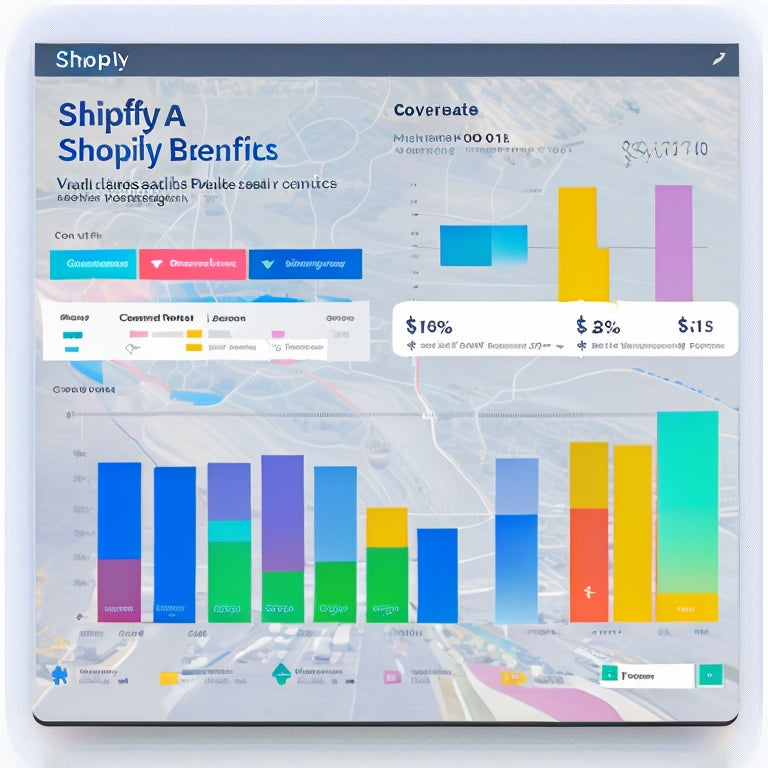
What Are the Benefits of Shopify Analytics
Share
Shopify Analytics is a valuable tool for e-commerce businesses, providing numerous benefits that contribute to their success. This article examines the advantages of utilizing Shopify Analytics, offering insights into the various ways it can enhance decision-making processes, optimize marketing strategies, and drive customer engagement.
Additionally, this article provides tips for effectively leveraging Shopify Analytics, as well as helpful tutorials that offer practical guidance. By exploring the diverse range of Shopify Analytics tools, businesses can gain a deeper understanding of their online performance and make informed decisions to achieve their goals.
- Enables data-driven decision making
- Facilitates improved customer targeting
- Enhances inventory management
- Contributes to increased sales conversion rates
Benefits of Shopify Analytics for E-commerce Businesses
The use of Shopify analytics in e-commerce businesses offers numerous benefits.
Firstly, it enables data-driven decision making, allowing businesses to base their strategies and actions on concrete and reliable data.
Secondly, it facilitates improved customer targeting by providing insights into customers' preferences, behaviors, and demographics, enabling businesses to tailor their marketing efforts and offerings accordingly.
Lastly, Shopify analytics enhances inventory management by providing real-time data on stock levels, allowing businesses to optimize their inventory and avoid stockouts or overstocking.
Ultimately, these benefits contribute to increased sales conversion rates and provide businesses with a competitive advantage in the e-commerce market.
Data-Driven Decision Making
Data-driven decision making is a valuable approach in utilizing Shopify analytics for making informed business choices. By conducting thorough data analysis, businesses can gain valuable insights into customer behavior, market trends, and the effectiveness of marketing strategies.
This data-driven approach allows businesses to make evidence-based decisions, ensuring that resources are allocated efficiently and effectively. Data analysis enables businesses to identify patterns and trends, helping to optimize marketing efforts and tailor strategies to specific customer segments.
With data-driven marketing, businesses can measure the success of their campaigns, track conversion rates, and identify areas for improvement. By utilizing Shopify analytics, businesses can make data-driven decisions that lead to improved customer engagement, increased sales, and overall business growth.
This approach fosters a sense of belonging for businesses by providing them with the tools and knowledge necessary to make informed choices that align with their goals and objectives.
Improved Customer Targeting
Improved customer targeting is an essential aspect of businesses' decision-making process when utilizing data analysis for informed choices. By implementing customer segmentation strategies, businesses can identify distinct groups of customers with similar characteristics and preferences.
This allows for the development of personalized marketing campaigns that resonate with specific customer segments, leading to increased customer engagement and loyalty. Data-driven analysis enables businesses to gather valuable insights into customer behavior, demographics, and purchasing patterns.
These insights can then be used to create targeted marketing messages, tailored product offerings, and personalized experiences that cater to the unique needs and desires of each customer segment. By focusing on improved customer targeting, businesses can foster a sense of belonging among their customers, resulting in higher customer satisfaction, increased brand loyalty, and ultimately, improved business performance.
Enhanced Inventory Management
Enhanced inventory management plays a crucial role in optimizing business operations and meeting customer demands efficiently.
Effective inventory tracking allows businesses to have real-time visibility into their stock levels, enabling them to make informed decisions regarding purchasing, restocking, and fulfillment. This not only helps in avoiding stockouts and overstocking but also reduces carrying costs and minimizes the risk of obsolescence.
By analyzing historical sales data and market trends, demand forecasting enables businesses to accurately predict future demand, ensuring that the right amount of inventory is available at the right time. This prevents lost sales due to stockouts or excess inventory that ties up capital.
Additionally, by integrating inventory management with other aspects of the business, such as sales and operations planning, businesses can achieve better coordination and synchronization, resulting in improved customer satisfaction and increased profitability.
Increased Sales Conversion
An effective sales conversion strategy relies on analyzing customer behavior and optimizing the sales process to maximize the likelihood of converting leads into paying customers.
Website optimization plays a crucial role in this process, as it helps to enhance the overall user experience, leading to increased revenue.
By utilizing Shopify analytics, businesses can gain valuable insights into customer behavior, such as their browsing habits, preferences, and purchasing patterns. This data-driven approach allows businesses to identify areas for improvement and make data-informed decisions to optimize their website for better sales conversions.
By implementing strategies such as improving website navigation, streamlining the checkout process, and personalizing the shopping experience, businesses can increase the likelihood of converting leads into paying customers, ultimately leading to higher revenue generation.
Therefore, incorporating website optimization techniques based on Shopify analytics can greatly benefit businesses in achieving their sales conversion goals.
Competitive Advantage Gained
The increased sales conversion resulting from Shopify analytics can provide businesses with a competitive advantage. By analyzing customer behavior and purchase patterns, businesses can gain valuable insights into their target market and identify areas for improvement. This allows them to tailor their marketing strategies and product offerings to better meet customer needs, ultimately leading to increased sales and customer satisfaction.
Additionally, Shopify analytics enables businesses to conduct competitive analysis and market research. By comparing their performance against competitors and examining industry trends, businesses can identify gaps in the market and capitalize on new opportunities. This data-driven approach empowers businesses to make informed decisions and stay one step ahead of their competitors.
Overall, Shopify analytics provides businesses with the tools and information needed to gain a competitive edge and thrive in the market.
Tips for Shopify Analytics
This discussion focuses on the importance of key data metrics, conversion rate optimization, tracking customer behavior, and improving marketing strategies in the context of Shopify analytics.
Key data metrics enable businesses to analyze and measure their performance, identify areas for improvement, and make data-driven decisions.
Conversion rate optimization involves identifying and implementing strategies to increase the percentage of website visitors who complete a desired action, such as making a purchase.
Tracking customer behavior helps businesses understand how customers interact with their website and products, allowing for targeted marketing efforts.
Lastly, improving marketing strategies involves utilizing data insights to refine and optimize marketing campaigns for better customer engagement and conversion rates.
Key Data Metrics
Key data metrics in Shopify analytics provide valuable insights into the performance and effectiveness of an online store. Customer segmentation is one such metric that allows online retailers to categorize their customer base into distinct groups based on various characteristics such as demographics, purchase history, and browsing behavior. This segmentation enables targeted marketing strategies and personalized experiences, leading to increased customer satisfaction and loyalty.
Sales forecasting is another crucial metric that helps businesses predict future sales based on historical data and market trends. By analyzing past sales patterns, businesses can make informed decisions regarding inventory management, marketing campaigns, and resource allocation. Accurate sales forecasting minimizes the risk of overstocking or understocking, ultimately optimizing business operations and profitability.
Overall, these key data metrics in Shopify analytics empower online retailers to make data-driven decisions, enhance customer experiences, and drive business growth.
Conversion Rate Optimization
Conversion rate optimization is a crucial aspect of online retail that focuses on improving the percentage of website visitors who complete desired actions, such as making a purchase or signing up for a newsletter. This process involves analyzing website traffic to identify areas of improvement and implementing strategies to increase conversion rates.
By utilizing website traffic analysis, retailers can gain valuable insights into user behavior, preferences, and pain points, allowing them to make data-driven decisions to optimize their websites. Through continuous testing and analysis, retailers can identify and eliminate barriers that hinder conversion rates, such as confusing navigation, slow loading times, or lack of trust signals.
Optimization efforts can range from making minor adjustments to redesigning the entire website. By implementing conversion rate optimization strategies, online retailers can maximize their website's potential and increase customer engagement and sales.
Tracking Customer Behavior
Tracking customer behavior is an essential practice in online retail. It involves monitoring and analyzing user interactions, preferences, and actions on a website to gain insights and make data-driven decisions for optimization purposes.
Customer segmentation plays a crucial role in this process. It helps to categorize customers into distinct groups based on shared characteristics and behaviors. By segmenting customers, online retailers can better understand their needs, preferences, and purchasing patterns. This allows them to tailor their marketing strategies and offerings accordingly.
Furthermore, predictive analytics can be employed to forecast future customer behavior based on historical data and statistical models. This enables retailers to anticipate customer needs, personalize their experiences, and optimize marketing campaigns to drive higher conversions and customer satisfaction.
Overall, tracking customer behavior through customer segmentation and predictive analytics empowers online retailers to make informed decisions that maximize customer engagement and drive business growth.
Improving Marketing Strategies
In order to improve marketing strategies, Shopify analytics provides valuable insights through the use of marketing automation and customer segmentation.
Marketing automation refers to the use of software tools to automate repetitive marketing tasks, enabling businesses to streamline their processes and reach customers more efficiently. By utilizing marketing automation, businesses can create personalized and targeted marketing campaigns that resonate with different customer segments.
Customer segmentation, on the other hand, involves dividing customers into distinct groups based on similar characteristics such as demographics, purchasing behavior, and preferences. This segmentation allows businesses to tailor their marketing efforts to specific groups, ensuring that the right message is delivered to the right audience.
Helpful Tutorials for Shopify Analytics
An extensive collection of informative tutorials is available to assist Shopify users in mastering the intricacies of analytics. These tutorials provide valuable insights into using the Shopify analytics dashboard to analyze customer demographics. The Shopify analytics dashboard offers a comprehensive overview of key metrics such as sales, traffic, and customer behavior.
By analyzing customer demographics, Shopify users can gain a deeper understanding of their target audience, enabling them to tailor their marketing strategies accordingly. This data-driven approach allows businesses to identify trends, preferences, and purchasing behavior of different customer segments. Armed with this knowledge, Shopify users can make informed decisions regarding product offerings, pricing strategies, and targeted promotions.
The tutorials offered by Shopify provide step-by-step guidance on how to navigate the analytics dashboard, interpret the data, and apply these insights to drive business growth and customer satisfaction.
Learn More About Shopify Analytics Tools
Shopify analytics integration provides numerous benefits for businesses by leveraging data analysis. One of the key advantages is the ability to gain valuable insights into customer behavior, preferences, and trends. This data-driven approach allows businesses to make informed decisions regarding inventory management, marketing strategies, and customer engagement.
By analyzing various metrics such as conversion rates, average order value, and customer lifetime value, businesses can identify opportunities for growth and optimize their operations. Furthermore, Shopify analytics tools enable businesses to track the performance of marketing campaigns, assess the effectiveness of different sales channels, and identify areas for improvement.
This data-driven approach empowers businesses to allocate resources more effectively, reduce costs, and increase profitability. Overall, utilizing Shopify analytics integration and harnessing the benefits of data analysis can provide businesses with a competitive edge in today's dynamic e-commerce landscape.
Frequently Asked Questions
How Can I Integrate Shopify Analytics With My E-Commerce Website?
Integrating Shopify Analytics with an e-commerce website offers numerous benefits for businesses. It enables effective utilization of Shopify Analytics to optimize online stores, leading to improved decision-making and enhanced performance.
Can Shopify Analytics Help Me Track the Performance of Specific Products or Collections?
Shopify Analytics can assist in tracking the performance of specific products or collections by providing data on conversion rates and customer behavior. This enables businesses to analyze and optimize their offerings to better meet customer needs and increase sales.
Are There Any Limitations or Restrictions to Using Shopify Analytics?
When considering the use of Shopify Analytics, it is important to be aware of the potential limitations and restrictions. These may include issues with data accuracy, limited customization options, and the need for technical expertise to fully utilize the platform.
Can I Customize the Metrics and Reports in Shopify Analytics to Fit My Specific Business Needs?
Customization options in Shopify Analytics allow for the tailoring of metrics and reports to suit specific business needs. Data segmentation enables the analysis of different customer segments, providing valuable insights for decision-making and improving overall business performance.
Does Shopify Analytics Offer Any Advanced Features or Integrations for Larger E-Commerce Businesses?
Shopify Analytics offers advanced analytics and data visualization features that cater to the needs of larger e-commerce businesses. These features enable businesses to gain deeper insights into their data, make informed decisions, and optimize their operations for improved performance and growth.
Related Posts
-
How Can I Optimize My Videos for Seo on Shopify?
In today's digital landscape, optimizing videos for SEO on Shopify has become crucial for businesses looking to incr...
-

Enhance Your Shopify Store's Search and Discovery Experience
This article aims to explore strategies to enhance the search and discovery experience for Shopify store owners. Sho...
-

Unlocking Revenue Potential: Join the Shopify App Store Revenue Share Plan
The Shopify App Store has implemented a new revenue share plan for its partners, aimed at unlocking their revenue po...

